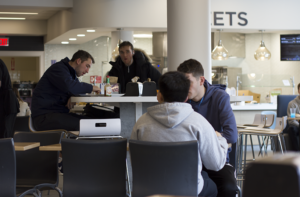Workers rights student activists expressed grievances of low wages on behalf of Georgetown food service workers at a Feb 14. open forum about ongoing labor contract negotiations.
Georgetown food service workers at O’Donovan Hall, Leavey Court and Einstein’s Bagels in Car Barn are represented by the Washington, D.C. branch of UNITE HERE!, a labor union that assists over 100,000 food service employees worldwide.

UNITE HERE! and Aramark reached a three-year employment contract deal in 2012, which was renegotiated and renewed in 2015 for another three years. The union had its first meeting with the Aramark to renegotiate a new labor contract after its expiration this past December.
The Georgetown Solidarity Committee, a student group committed to promoting workers’ rights, and La Casa Latina, which provides resources for Latinx students on campus, co-hosted an event titled, “Where’s the Love, Aramark?” Students spoke about the menial conditions faced by Georgetown food service employees. No Aramark workers were present at the event.
La Casa Latina hosted the event to stand in solidarity with dining workers as many of Aramark’s food service workers are people of color, according to La Casa Latina Director Joseph Rodriguez.
“La Casa Latina supports the members of UNITE HERE! Local 23 as they bargain with Aramark,” Rodriguez wrote in an email to The Hoya. “We hope that the workers, many of whom are people of color that work long hours for low wages, can win a contract that accurately reflects the value and dignity of themselves and of their labor.”
Washington, D.C.’s living wage is approximately $37,000 a year, according to the Massachusetts Institute of Technology’s Living Wage Calculator. On average, Aramark food service workers at Georgetown make around $23,000 a year, according to Glassdoor.
With labor negotiations still ongoing, students must continue to show solidarity with Georgetown food service employees GSC member Gabriel Berger (COL ’21) said.
“Our general plan is to make sure that the facts are known, students are present, and that our voices our heard,” Berger said. “We know that in the past that has led to change, and we’re confident that it will lead to change this time too.”
Georgetown food service employees are also seeking out better employee benefits, according to GSC member Mariel Mendez (COL ’21).
“Another central thing is that they want their benefits to be continued and to be expanded,” Mendez said. “For their pension to be increased, their Medicare to be improved, their healthcare to be improved. Even simple things like getting parking”
Communication between student-run organizations and union employees often occurs within limited time slots and with limited opportunity for in-depth conversation, Berger said. There are likely plenty more issues that workers have yet to voice.
“It’s really hard to find a manager-free space to talk. And that’s important, because even as we grow more informed, we don’t know everything workers know,” Berger said. “It’s important to keep in mind that we don’t know the whole story here, we are just getting some of the basic facts.”
This is not the first time students have advocated for better working conditions for food workers at Georgetown. In January 2012, students and employees staged a demonstration in O’Donovan Hall for the negotiation of a more fair labor contract between Aramark and the UNITE HERE! union. After a year of prolonged talks, workers were able to secure benefits like pay increases, signing bonuses, and year-round health insurance for all hires.
In 2015, 30 GSC members marched with 20 Aramark workers to Aramark leadership with a petition. Aramark management eventually agreed to workers’ demands, such as a 40-hour paid workweek, an agreements process to report managerial abuse or discrimination, and a cheaper healthcare insurance plan.
The current negotiations follow a tumultuous few years for Aramark, which recently came under fire with accusations of employee negligence and health violations throughout its service locations in North America, Asia, Europe and South America.
In 2010, Aramark paid $3.9 million to settle a class action lawsuit alleging that thousands of employees in California were not paid for all hours worked. Three years later, Aramark paid $2.75 million to settle a similar lawsuit involving unpaid wages.
Students need to remember their advocacy is limited by their experiences, Berger said.
“Even as we grow informed, we don’t know everything workers know,” Berger said. “It’s important to keep in mind we don’t know the whole story here. We’re just getting basic facts.”




















